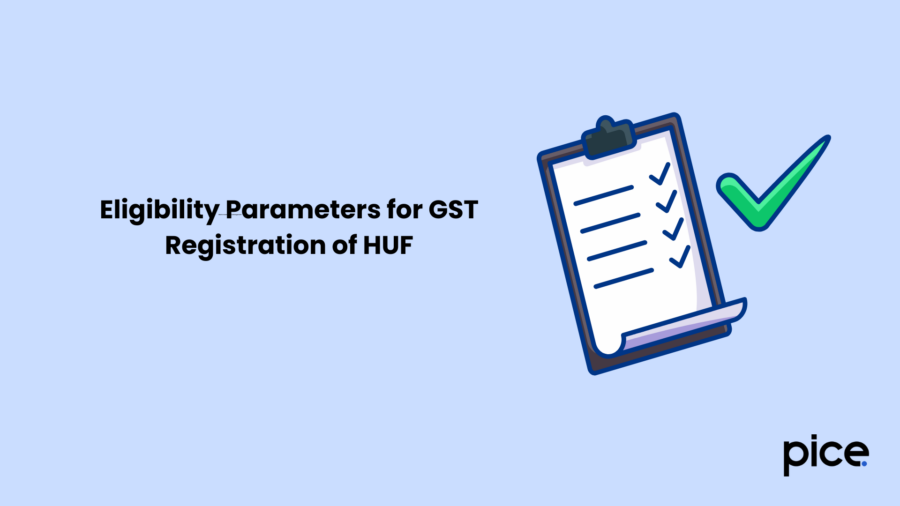Documents required for GST Registration for HUF
- 21 May 25
- 12 mins

Documents required for GST Registration for HUF
Key Takeaways
- HUFs must register for GST if turnover crosses ₹40L (goods) or ₹20L (services).
- The Karta handles GST registration on the official portal.
- PANs, address proof, and bank details are mandatory documents.
- GST allows ITC claims and access to e-commerce platforms.
- Timely registration and return filing prevent penalties.
Goods and Services Tax (GST) is a crucial indirect tax that applies to businesses, including Hindu Undivided Family (HUFs) engaged in trade or commerce. A HUF must register under GST if its business turnover exceeds the prescribed threshold.
The GST registration process for an HUF follows a structured approach where Karta, the head of the family, undertakes compliance responsibilities and register themselves under the GST tax structure via the official government tax portal.
This registration enables the HUF to claim Input Tax Credit (ITC), legally collect GST from customers, and expand business opportunities. Knowing the eligibility criteria, documents required, and benefits of GST registration for HUFs is essential for seamless compliance.
Continue reading to explore the entire registration procedure, eligibility criteria, documents required for GST registration for HUF, and other essential details.
The GST Registration Process for HUF

Here is the step-by-step guidance for the HUF registration process. Follow this to get GST registration as a member of the Hindu Undivided Family (HUF)
Step 1: First, visit the official GST portal, which is www.gst.gov.in
Step 2: Click on the 'Register' option. You will find this option by selecting the 'Taxpayers' button.
Step 3: Click the 'New Registration' button and submit all the details(your state and district name, type of employment, PAN card details, mobile number, and email ID). Make sure the email ID and mobile number you submitted are active, as you will receive OPTs from the GST portal.
Step 4: Enter the CAPTCHA and select the 'Proceed' button.
Step 5: Instantly, you will receive an OTP or one-time password on your email ID or mobile number. Enter the OTP in the respective boxes.
Step 6: On the next page, a number will appear alongside your TRN or Temporary Reference Number (TRN). Make sure to note this number for future reference.
Step 7: Then visit the GST official website again and click on the 'Register' button under the 'Taxpayers' menu.
Step 8: Select the 'TRN', enter the CAPTCHA, and click the 'Proceed' button again.
Step 9: You will receive another OTP on your email ID or mobile number registered on this portal. Enter that OTP on the following page and proceed.
Step 10: The GST registration application is on the next page. To access it, select the 'Edit' option on the right.
Step 11: Now, you will discover 10 different segments to fill out the necessary information and upload the essential documents as support.
Step 12: Then, visit the following page, which has a 'Verification' button. By selecting this, you agree to the declaration. After this, you can complete the process by submitting your application form using the following methods.
- Electronic Verification Code (EVC): If you choose this method, you will receive an EVC on your mobile number aligned with this process.
- Digital Signature Certificate (DSC): You can submit your application form using the Digital Signature Certificate (DSC).
- Signing Digitally: In this process, you need to enter an OTP sent to the phone number linked with UIDAI, the government authority that oversees all things related to Aadhaar.
Step 13: Once you complete the previous process, you will receive a success notification on your phone number or email ID. This notification will include an Application Reference Number (ARN) that you need to note for future reference.
Step 14: After completing all these steps, the GST officer will check and approve the documents. Sometimes, the officers reject the GST application if you do not submit the documents required for GST registration for HUF or submit them in the appropriate way.
Step 15: Once you get approval, the GST registration process will be completed successfully. The respective person will get the login credentials.
Eligibility Parameters for GST Registration of HUF

When considering GST registration for a Hindu Undivided Family (HUF), it's important to understand the eligibility parameters. Here's a breakdown:
Turnover Threshold:
- The primary factor is the aggregate turnover of the HUF's business.
- For suppliers of goods, the threshold is generally ₹40 lakhs in a financial year. However, this can vary.
- For suppliers of services, the threshold is generally ₹20 lakhs in a financial year.
- It's important to note that these thresholds can differ for certain special category states.
Interstate Supply:
- If the HUF is involved in the interstate supply of goods or services (i.e., supplying from one state to another), GST registration is mandatory, regardless of the turnover.
Other Mandatory Registrations:
- Certain activities necessitate GST registration, regardless of turnover. These include:
- Casual taxable persons.
- Non-resident taxable persons.
- Persons required to pay tax under the reverse charge mechanism.
- E-commerce operators.
Voluntary Registration:
- Even if the HUF's turnover is below the mandatory threshold, it can still opt for voluntary GST registration. This can provide benefits like input tax credit.
PAN of HUF:
- The HUF must have its own Permanent Account Number (PAN).
Karta's Details:
- The PAN and Aadhaar card of the Karta (the head of the HUF) are also required.
Types of GST Registration for HUF
There are several types of GST registration process available for Hindu Undivided Family or HUFs. The details are discussed below:
Mandatory Registration:
- The Indian Government establishes a minimum threshold below which mandatory GST registration may not be required. No business, including HUFs, can generate revenue exceeding 30% of their common capacities yearly.
- If a HUF's total annual turnover, including the sale of products and services, surpasses this specified limit, GST registration becomes mandatory.
- The existing compulsory registration threshold and the applicable GST percentage can be verified by a tax advisor or by visiting the official GST website.
Voluntary Registration:
- A simple HUF includes entities that fall under the VAT registration threshold. However, they can opt for GST registration under a voluntary registration scheme. Both small-scale and large-scale businesses can benefit from ITC credits by opting for GST.
- They also gain access to large-scale market places. Registering voluntarily can be a strategic decision for HUFs. They should consider this while taking into consideration their business goals and expansion plans.
Necessary Documents for HUF GST Registration
Read the table below to understand all the necessary documents for the taxpayers of HUF for successful GST registration online.
| SL. No. | Documents You Need to Upload |
| 1. | Permanent Account Number (PAN) card of HUF |
| 2. | The PAN card of Karta |
| 3. | Address proof of business registration |
| 4. | Bank account details (first page of a bank statement or cancelled cheque imprinted with the account holder's name) |
| 5. | Coloured passport-size photo of owner |
| 6. | Business registration certificate (if any) |
Key Benefits of GST Registration
Being a member of the Hindu Undivided Family, you need to opt for GST registration if your annual turnover exceeds the set limit. Listed below are the advantages of GST registration for HUF:
- Simplifies Taxation Services: The Goods and Services Tax (GST) system in India combines a number of indirect taxes into a single system. It enhances the efficiency of taxation services across the country and fosters a more integrated Indian market.
- Brings Consistency in Taxation Process: GST registration ensures consistency in the taxation system in India. It enables a centralized registration procedure, which simplifies the process for business owners. They can now file tax returns online every quarter while sitting at home.
- Fosters High Level of Transparency: By choosing to register for GST, you get a comprehensive idea about the taxes you will pay and the taxes collected by the governments. This not only helps eliminate confusion but also manipulation within the tax departments.
- Streamlines Time-consuming Taxation Services: A small-scale business owner can avoid lengthy taxation services by opting for GST Registration. It is because service providers earning less than ₹20 Lakhs yearly and product suppliers with an annual turnover below ₹40 Lakhs are exempt from GST payments.
- Helps in Getting Foreign Clients: Multinational companies or MNCs usually do not show interest in working with small business owners who can not show appropriate tax registration documents. So, opt for GST Registration to get foreign clients as well.
- Enables Better Revenue Collection: As the majority of individuals comply with GST registration rules and meet various obligations, such as timely filing tax returns and cautious tax compliance, it helps boost the tax revenue collection process for both central and state government agencies. It also ensures a more transparent and efficient taxation system.
- Provides Opportunity to Deal with E-commerce Sites: Without GST registration, you can not sell products or services on an e-commerce site. Popular e-commerce platforms, including Paytm, Shopify, Flipkart, and Amazon, ask to enter a GSTIN to access their platform for business purposes.
- High Eligibility Criteria for Registration: If you consider the previous VAT system, businesses were required to pay VAT with an annual turnover exceeding ₹5 Lakhs in India. However, service providers with a turnover of ₹10 Lakhs or less were exempt from service tax. In today's scenario, this threshold was raised to ₹20 Lakhs after introducing the GST in India. It provides relief to many small-scale business owners and service providers.
Can a Lady be be a HUF Karta?
The answer is yes. When considering previous days, a lady was not able to become a HUF Karta. The Hindu Succession Act, of 1956, initially allowed only male candidates as Karta of HUF.
However, after a major legal change, women can serve this role. An amendment in 2005 revised this provision. Under Section 6 of the Act, females have the same inheritance rights as males in ancestral property, allowing them to serve as kartas.
The Essential Things to Consider Before GST Registration

These are the vital things you need to keep in mind at the time of GST registration:
- Compulsory PAN
The PAN is mandatory, along with other documents like address proof of business registration and bank account details. The PAN card of the HUF and the PAN card of the Karta are needed to submit, as the GST Registration process is PAN-based.
- Thirty Days Timeline
You need to apply for GST registration in every state within thirty days of meeting the eligibility criteria.
- Five Days Timeline for Casual/Non-Resident Taxable Person
These individuals are required to apply for GST registration five days before launching their venture.
- Application Rejection
Your GST registration application may be rejected if you can not provide the necessary documents. Before dismissing the application, the concerned GST officer will notify you, raise queries, and request the required documents.
However, your application may be denied if you fail to submit valid documents. Therefore, ensure accuracy and completeness when submitting your documents.
- Proper filing of GST Returns
Once you get your registration number, the countdown for GST return filing begins. If you fail to file on time, you have to pay a ₹50 daily penalty, capped at ₹10,000 per month.
Regular taxpayers must file GSTR-3B monthly and GSTR-1 monthly or quarterly, while composition taxpayers need to submit GSTR-4 every quarter.
- Due date of GST file Return
For regular taxpayers, the GSTR-3B file monthly return is due by the 20th of the following month. When considering GSTR-1, they need to file it monthly (if their revenue exceeds ₹1.5 crore) or quarterly (if the revenue is up to ₹1.5 crore).
Monthly filings are due by the 11th of the following month, while quarterly filings are due by the 30th/31st of the following month from the end of the relevant quarter.
- Account and Records Maintenance
Being a taxpayer, you must maintain proper records to avail of input tax credits under the GST framework. You must keep and maintain records of production, inward and outward supply of products or services, stock, input tax credit, output tax liability, and any other necessary documents as prescribed.
Avoid Tax Evasion
Tax evasion is a serious crime in India. Never attempt to falsify your books of accounts. The GST structure implements strict regulations, ensuring compliance and transparency.
Conclusion
Registering for GST as a Hindu Undivided Family (HUF) ensures compliance with tax regulations while unlocking benefits like Input Tax Credits and business expansion opportunities. With simplified taxation and higher exemption thresholds, GST registration empowers HUFs to operate efficiently.
Overall, this blog has helped you understand eligibility and the documents required for GST registration for HUFs, which is crucial for seamless registration and long-term financial growth.
💡If you want to streamline your invoices and make payments via credit or debit card or UPI, consider using the PICE App. Explore the PICE App today and take your business to new heights.
 By
By 
















